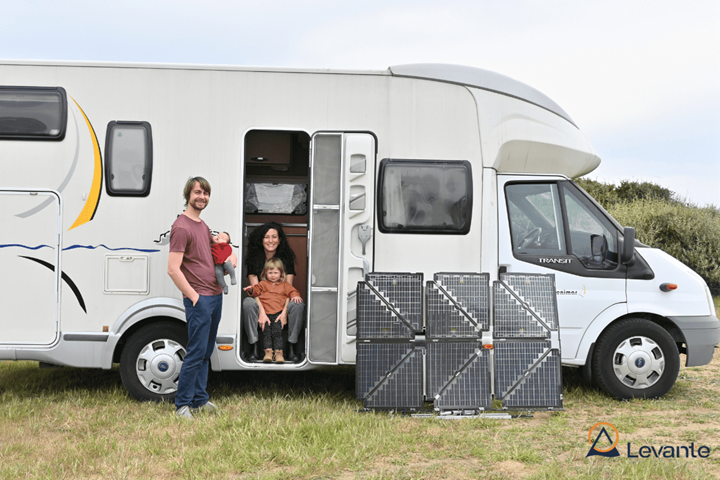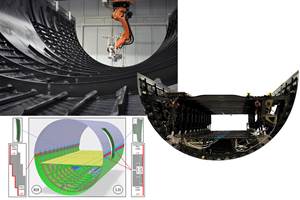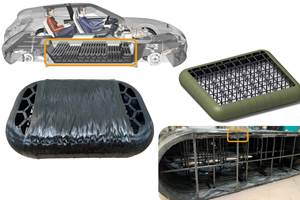Italian startup, Advanced Composites Solutions develop portable solar panel via recovered carbon fiber
Origami-inspired panel from Levante and ACS upcycles supercar scrap, solves energy accessibility for off-the-grid travelers.
Startup company Levante (Milan, Italy) and Advanced Composites Solutions (ACS, Bologna and Tortoreto Italy), a specialist in the design and manufacture of composite material components for various industrial sectors, collaborated on the recovery of carbon fiber waste to produce a portable, origami-inspired solar panel. The completed panel recently won the 2022 Best Practices Award for Innovation (Greentech category).
The prize, promoted and organized by the Italy-based association, Confindustria Salerno, is a prestigious award that, for the past 18 years, has has been awarded to top Italian companies, spin-offs and startups, promoting an initiative of cultural innovation and project collaboration. A total of 60 projects, selected by Confindustria in the Internet of Things, Digitization and Greentech categories, competed for the prize.
According to Sara Plaga and Kim-Joar Myklebust, founders of Levante, the startup was created to simplify the access to energy with a more efficient, versatile and accessible solution. The idea of the startup, which is said to be among the top 50 startups in Europe for sustainable mobility, was born from a problem Plaga and Myklebust felt firsthand; as sailors and camper users, they felt the need to have access to energy everywhere during their travels.
The compact, portable and deployable solar panel was born from this need. By simplifying the design of green energy with a recycled and renewable product, Levante says it has revolutionized the concept of static solar panels, creating a patent-pending product that can be taken anywhere and used off the grid.
ACS, an international company founded six years ago by engineer and entrepreneur, Roberto Catenaro, provided the project’s carbon fiber waste, which was recovered from the automotive industry — according to ACS, almost 40% of the carbon fiber used for the production of a single race car is discarded (about 250 kilograms). Through this upcycling process, the scrap fiber was subsequently used in the production of the solar panel’s frame, mechanical arms and hinges, in order to make the panel lighter and more portable.
Ultimately, the collaboration between Levante and ACS — with the aim of reducing the environmental impact of both companies — also enabled both partners to reduce the amount of waste and raw materials used.
“We have always been committed to research projects that go in the direction of improving our processes and our technologies but also avoiding waste,” Catenaro says. “We are happy that the partnership with Levante arouses the interest of privileged observers. This pushes us to move forward with enthusiasm and greater determination.”
“Levante wants to create clean energy in a portable format, but creating clean energy alone is not enough,” Plaga adds. “We want to be responsible for the impact of the product we are creating. The collaboration with our partner ACS allows us to combine and optimize the technologies available on the market and make them more effective for a common benefit. We would like to thank Confindustria of Salerno for this recognition, which represents for us a confirmation that we are on the right path towards a world where resources are provision are exploited in an optimal way.”
Related Content
Manufacturing the MFFD thermoplastic composite fuselage
Demonstrator’s upper, lower shells and assembly prove materials and new processes for lighter, cheaper and more sustainable high-rate future aircraft.
Read MoreCombining multifunctional thermoplastic composites, additive manufacturing for next-gen airframe structures
The DOMMINIO project combines AFP with 3D printed gyroid cores, embedded SHM sensors and smart materials for induction-driven disassembly of parts at end of life.
Read MorePlant tour: Teijin Carbon America Inc., Greenwood, S.C., U.S.
In 2018, Teijin broke ground on a facility that is reportedly the largest capacity carbon fiber line currently in existence. The line has been fully functional for nearly two years and has plenty of room for expansion.
Read MoreTU Munich develops cuboidal conformable tanks using carbon fiber composites for increased hydrogen storage
Flat tank enabling standard platform for BEV and FCEV uses thermoplastic and thermoset composites, overwrapped skeleton design in pursuit of 25% more H2 storage.
Read MoreRead Next
Developing bonded composite repair for ships, offshore units
Bureau Veritas and industry partners issue guidelines and pave the way for certification via StrengthBond Offshore project.
Read More“Structured air” TPS safeguards composite structures
Powered by an 85% air/15% pure polyimide aerogel, Blueshift’s novel material system protects structures during transient thermal events from -200°C to beyond 2400°C for rockets, battery boxes and more.
Read MoreVIDEO: High-volume processing for fiberglass components
Cannon Ergos, a company specializing in high-ton presses and equipment for composites fabrication and plastics processing, displayed automotive and industrial components at CAMX 2024.
Read More


























